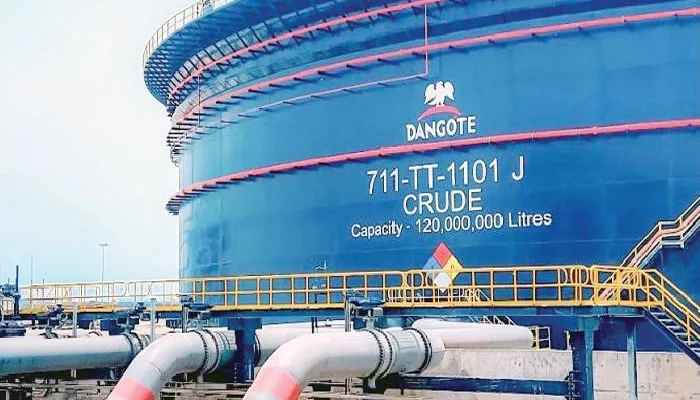A New Era for Regional Fuel Markets
In a significant development for West Africa’s energy sector, the Dangote Refinery has officially started exporting petrol to neighbouring Togo. This marks the beginning of what could be a game-changing shift in regional fuel markets. According to ship-tracking data, the tanker CL Jane Austen recently loaded over 300,000 barrels of petrol from the refinery and set sail for waters off the coast of Togo.
Join our WhatsApp Channel“This is just the beginning,” said an official from Dangote Refinery. “The start of exports signals our readiness to supply not just Nigeria, but several West African nations with affordable, locally refined petrol.”
First Shipment to Togo
The CL Jane Austen has now anchored off the coast of Lomé, Togo, an area known for ship-to-ship (STS) transfers. While the shipment’s size is small in the context of the global fuel market, it is a clear signal that Dangote’s refinery is ramping up production and starting to supply more than just Nigeria’s domestic market. The move could disrupt the established fuel supply chains in West Africa.
“Though the shipment to Togo is a test run, it sets the stage for more substantial exports,” the refinery official added. “This is just the first of many to come.”
Potential to Reshape Regional Markets
As one of the largest refineries in Africa, the Dangote Refinery is capable of processing up to 650,000 barrels of oil per day. This is set to be a major shift in how petroleum products are distributed across West Africa.
Last month, the refinery sent its first petrol shipment to Lagos, further demonstrating its growing capacity. Now, with the first export of petrol to Togo, the Dangote Refinery is eyeing other regional markets, including Ghana, Benin Republic, and South Africa.
READ ALSO: Is Dangote Refinery’s 60 Million Litres Enough For Nigeria?
“This refinery is a critical piece of Africa’s energy future,” said Mustapha Abdul-Hamid, Ghana’s Chief Oil Regulator. “We are considering importing petrol from Dangote Refinery as it would help us cut freight costs and reduce pressure on our foreign exchange market.”
Regional Partnerships and Export Prospects
Ghana, one of the likely buyers of Dangote’s petrol, has expressed strong interest in importing fuel from the Nigerian refinery. Abdul-Hamid noted that Ghana’s reliance on fuel imports from Rotterdam could soon be reduced by tapping into Dangote’s locally refined products. This would not only bring down fuel prices but also stabilize the region’s exchange rate.
“If the Dangote Refinery reaches its full capacity, Nigeria will not consume all the fuel. Exporting to neighboring countries like Ghana will help reduce logistics costs and lower the overall cost of living,” Abdul-Hamid explained.
Other countries in West Africa, including Benin Republic and South Africa, are reportedly in discussions to purchase fuel from the Dangote Refinery. The refinery’s exports will likely play a crucial role in meeting the region’s growing demand for refined petroleum products.
Impact on Nigeria’s Fuel Imports
Despite being Africa’s largest oil producer, Nigeria has long relied on imported petrol, mainly due to insufficient refining capacity. Dangote Refinery is expected to address this gap. However, the country still imports a large portion of its fuel, despite the refinery’s operations.
In the meantime, Nigeria continues to import petrol from Europe and the United States, with imports accounting for a significant portion of the country’s fuel consumption. However, with Dangote’s production ramping up, the need for imports is expected to decrease in the coming years.
“We are optimistic that the Dangote Refinery will not only satisfy domestic needs but will also change the landscape for fuel imports and exports in Africa,” said a spokesperson for the Nigerian Ministry of Petroleum Resources.
Dangote’s Vision for Africa’s Energy Future
The Dangote Refinery, built at a cost of $20 billion, is set to become the largest refinery in Africa and Europe when it reaches full capacity. Aliko Dangote, Africa’s wealthiest individual, is positioning the refinery as a cornerstone of Africa’s energy security.
Once operational at full scale, Dangote Refinery will drastically reduce Nigeria’s reliance on imported fuel. This is a significant step in the country’s efforts to boost local refining capacity and cut the cost of fuel imports, which have burdened Nigeria’s economy for decades.
The refinery’s contribution to regional energy needs is also expected to ease the pressure on countries that have long relied on distant foreign markets for their fuel.
“We are not just refining for Nigeria, we are refining for the region. The Dangote Refinery is built to address the energy needs of West Africa,” Dangote stated during a recent speech on the refinery’s progress.
Looking Ahead
The future of the Dangote Refinery looks promising, with significant potential to transform both Nigeria’s fuel market and the broader West African region. As Dangote continues to increase production and exports, its impact on regional fuel markets could be profound. Traders and market observers are closely watching developments, as the refinery could soon challenge the dominance of established suppliers in the region.
Emmanuel Ochayi is a journalist. He is a graduate of the University of Lagos, School of first choice and the nations pride. Emmanuel is keen on exploring writing angles in different areas, including Business, climate change, politics, Education, and others.
- Emmanuel Ochayihttps://www.primebusiness.africa/author/ochayi/
- Emmanuel Ochayihttps://www.primebusiness.africa/author/ochayi/
- Emmanuel Ochayihttps://www.primebusiness.africa/author/ochayi/
- Emmanuel Ochayihttps://www.primebusiness.africa/author/ochayi/


















Follow Us